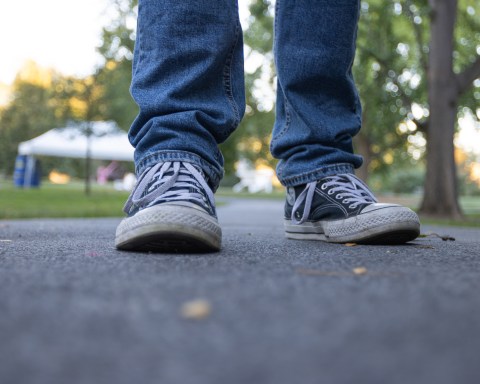
This weekend, hundreds of parents descended upon campus to attend dozens of events for Garnet Weekend, including sporting events, workshops, faculty lectures and tours of the campus and Crum. Students and their parents got to sample many of the activities available on campus throughout the year. However, one event that certainly doesn’t happen every day at Swarthmore was also one of the final events of the weekend. Students and their parents, as well as music aficionados from across the Philadelphia area, filled the Lang Concert Hall to listen to Orchestra 2001 and the Mendelssohn Club perform.
For two hours, the two groups performed “Northern Lights and Mystical Masterpieces,” a series presented only at the Church of the Holy Trinity in Center City Philadelphia as well as at Swarthmore, where all of Orchestra 2001’s concerts are held. Orchestra 2001 has been performing since 1988, when it was founded by artistic director and conductor James Freeman, who is also the Daniel Underhill Professor Emeritus of Music at Swarthmore. “I thought there was a great need in the Philadelphia area for world-class performances of contemporary music,” said Freeman. “As far as I know there are only two other orchestras in America that focus on exclusively or almost excusively on contemporary music. Other orchestras sometimes perform contemporary music — we always do.”
The Mendelssohn Club, founded in 1874, is one of the oldest choral groups in the United States, consisting of 130 voices and performs frequently in the Philadelphia area.
Orchestra 2001, in particular, has strong connections to the Swarthmore community. Founded by a Swarthmore professor more than two decades ago, the Orchestra is also joined by Swarthmore Associate in Performance Marcantonio Barone, who performs with Orchestra 2001 as well as other groups, as well as by Visiting Associate Professor of Music Janice Hamer, whose compositions have been performed by Orchestra 2001 and other groups. The orchestra has won the “Award for Adventurous Programming” from the League of American Orchestras for three years in a row and has done extensive international tours in various countries including Russia, England and Austria.
Additionally, the orchestra has premiered the work of Pulitzer-prize winner George Crum. “[Orchestra 2001] occupies a place of such importance that a classical music community without it seems unimaginable,” said Peter Dobrin, a critic in the Philadelphia Inquirer wrote about a concert in April 2002.
The Mendelssohn Club has grown from an eight-person male choral group born more than a century ago into an incredible 130-person chorus that focuses on performing new or rare works in combination with more traditional compositions, a tendency that has won the group the Chorus America Award for Adventurous Programming. Since 1988, the group has been directed by Alan Harler, a former Professor at Temple University’s Esther Boyer College of Music and a winner of the 2009 Award for Distinguished Contribution to the Musical Life of Philadelphia from the Musical Fund Society of Philadelphia.
In the Lang Concert Hall, the two groups performed four compositions: two presented by Orchestra 2001 alone, one presented by the Mendelssohn Club alone and one joint performance. “Lang Concert Hall in my view is really one of the great halls in the world (let alone America), both acoustically and visually for the performance of music,” said Freeman. “It allows us musicians to hear others and at the same time to hear the whole effect in a way that is very rare.”
The opening choral work was“Totus Tuus,” (“Wholly Yours”) Op. 60 by Henryk Gorecki, a 20th century Polish composer. The work was composed in 1987 for Polish Pope John Paul II and features repetition that both calms and moves the audience. Orchestra 2001 then performed “Shaker Loops,” a composition by John Adams, a professor at the San Francisco Conservatory of Music, that employs patterns of music in loops designed to emulate tapes that repeat music indefinitely.
After intermission, Orchestra 2001 took to the stage in the surprisingly intimate setting of Lang Concert Hall to perform two Philadelphia premieres, including “Messagesquisse,” a composition by Pierre Boulez whose title means “message sketch” in French. Then the Mendelssohn Club joined the Orchestra to perform “Adam’s Lament,” a piece by Arvo Part, a contemporary Estonian composer. The title refers to the Biblical Adam, and the music is meant to express his sorrows over the sins and trials of his progeny. “I could compare my music to white light which contains all colours. Only a prism can divide the colours and make them appear; this prism could be the spirit of the listener,” Part said in a discussion on his work by Orchestra 2001.
For those who missed the Sunday performance, there are many concerts and performances to look forward to in the coming six weeks. Swarthmore student groups and various music classes will be performing recitals in November. This coming Saturday, October 29, Student and Alumni Composers will recite their music in the Lang Concert Hall. Next month, the Swarthmore College Wind Ensemble, the Swarthmore College Chorus, the Chamber Wind Ensemble, and the College Orchestra will all have performances at Lang.
Outside performers will also visit to showcase their talents for the Swarthmore community at Lang. On November 7, Auricolae, a group that combines storytelling and music, will perform, while in December, an a capella ensemble called Lionheart will present Medieval English Christmas music.
“As a [Swarthmore student],” said Danielle Sullivan ’14 after the performance, “I feel lucky to have the opportunity to experience the amazing quality and the variety of music that comes [to Lang].”













